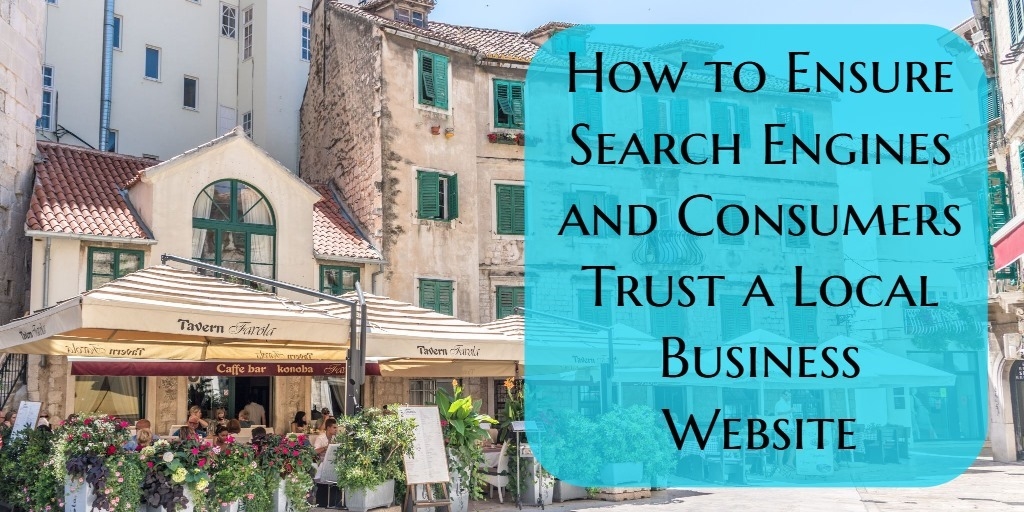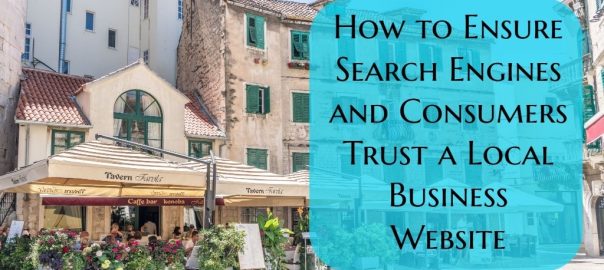
Search is complicated. Trust is complicated. Both of these are absolutely necessary for a local business or brand to place on the first page of search results. A business can’t just build a website, optimize it for search and wait for consumers to find it. The good ‘ol days are long gone.
Webmasters, SEOs and digital marketers alike have to be on the top of their game and employ an array of strategies to help their local business customers place in search results.
Trust Requires Action
Today, I’m going to focus on the strategies that will help build trust among search engines and, by proxy, consumers.
1. Expertise, Authoritativeness And Trustworthiness
You may be thinking this is old news. If you are, this is your first mistake. Google says content that is considered “quality” needs to demonstrate expertise, authoritativeness and trustworthiness (E-A-T).
This is so important that Google’s team of Search Quality Evaluators has a specific responsibility to access for this. Their sole job is to rate content that is published on the web.
Don’t think they are the only ones reviewing website content; there are countless algorithms that review content to determine its placement in search results based on usefulness and consumer intent (i.e. RankBrain).
If you manage a website using filler-type content created for the sole purpose of placing in the top of search for targeted keywords, you’ve probably noticed it getting less and less search traffic. Search engines are getting smarter, along with their algorithms.
When it comes to content, understanding what search engines deem quality content is the first and most important place to start. Get busy reviewing Google’s Search Engine Evaluator Guidelines today.
2. Focus On Authority
To build trust among search engines, authority needs to be demonstrated not just in a website’s content, but how the site is perceived by other authoritative sites.
As mentioned above, Google looks at expertise, trustworthiness and authoritativeness. Have you considered that you can’t actually build authority without expertise and trust?
It’s important to use SEO tools like SEMrush, Majestic and Ahrefs to evaluate authority metrics. You’ll want to evaluate page and domain authority, the backlink profile, social media shares and internal linking. While some of these may seem like vanity metrics, they can provide indicators in how search engines view a site.
Newer sites can struggle to place on the first page of search, because they are not yet trusted. Garnering links from authoritative sites like social networks, directories and other sources will improve trust.
Setting up Google Analytics, Google Search Console and submitting the site map will speed up indexing and provide important feedback on pages and posts that are getting found on search engines for newer sites.
3. Relevance Impacts Trust
While search engines can detect the topical nature of a site and a page from its content, the website can impact its placement by being connected with sites that are not relevant.
For example, a divorce attorney’s website getting a bunch of backlinks from a health and wellness website would have the reverse effect – it could damage trust and authority rather than help it.
While I highly recommend that every website have backlinks from broader sites like Facebook and Twitter, the backlink profile needs to contain a proportion of relevant sites. And these relevant sites need to contain authoritative links from other sites and have content that demonstrates E-A-T.
It’s a circle when you really think about it – quality websites need to have quality content, link to sites that have quality content, and get links from sites that have quality content to build trust and authority.
While on the subject of backlinks, it’s important to remember that a new backlink will not have the same impact as an aged one. The continual building of backlinks is an essential component of building trust. It is not a one-and-done process.
Avoid quick-fix solutions when it comes to building backlinks. As a backlink ages, the authority of the backlink will improve. As mentioned above, the backlink profile should be based on quality, not quantity. Disavow backlinks that are not relevant, authoritative or helpful.
4. Security Is A Must
I know it is tempting to skimp on things like website maintenance, investing in a security certificate and a staff member to monitor a website, but businesses cannot afford to skimp on this crucial component.
Search engines will blacklist websites that have viruses and show signs of hacking. They will demote sites that have security gaps and other related issues in search results. The simple truth is that websites that are not secure are vulnerable and put the visitor at risk.
Search engines and some anti-virus software alert site visitors when they visit a website that isn’t secure. Depending on the level of security and the search engine, they may even have to click a link requesting to visit the website anyway.
5. Don’t Skip The Basics
There are quite a few basics I could cover here that are common sense when it comes to impacting a website’s trust and placement in search, but I’m only going to cover a few.
Get the technicalities right for the site visitor. From navigation to design, site architecture and search, each of these components impact the user journey. If these are not considered, bounce rates will increase. Believe it or not, bounce is an indicator of trust. Google says a website’s bounce rate doesn’t impact ranking, but if enough searchers visit a website then immediately click back to search, it’s safe to assume the content wasn’t relevant to the searcher. Enough of these instances will send a signal to the search engine that the page or post isn’t relevant, which leads to it getting demoted in search results.
It’s important to use Google Analytics, Google Search Console and all the tools available to determine why a consumer visits a website and how they interact with it. Fixing broken links, images, and fine-tuning optimization is a continual process. These tools enable SEOs to do this.
Mobilization and site speed are critical. In 2015, mobilegeddon was upon us. The expectations, needs and demand has only increased since. With over 56% of site traffic being from mobile, according to SimilarWeb, a business’ website cannot afford to be negligent. In fact, Google just switched to the mobile index as the primary index for most websites. This index is what algorithms are using to serve the majority of searches.
Consumers are super-empowered today with a smartphone at their fingertips. Sridhar Ramaswamy pointed out at Google Marketing Live 2018, “As compared to 5 years ago, there are a billion more people on the internet today. There are 2x as many people on smartphones.” These consumers have high expectations – they’re curious, demanding and impatient. They want what they want, exactly when they want it.
Get the data right. I’m all about the data, especially data that impacts a local business or brand’s digital presence – their presence in search results, to be exact. Consistent citations, which is a mention of a business (usually online) is essential. Consistency builds trust after all.
Depending on where the citation is online, it can include the business name, address and phone number (NAP). Those on directory and review sites may also include a link to the business’ website. This information must be consistent. If it’s not, search engines and consumers lose trust. In fact, 80% of consumers lose trust in a local business if they find inconsistent contact details online according to BrightLocal’s Local Citations Trust Report 2018.
Building Trust Takes Effort
I started this by pointing out how building trust is complicated. There are many steps, strategies and factors along the path that will impact and equal success.
It all will require effort, dedication and time. While I would like to ensure you overnight success, the reality is that it takes times to build trust, but it is totally doable. You’re on the path to success now for expanding the local presence of the local businesses and brands you represent.
Share below some of the strategies that have worked for you to build trust among search engines and consumers.
Search is complicated. Trust is complicated. Both of these are absolutely necessary for a local business or brand to place on the first page of search results. A business can’t just build a website, optimize it for search and wait for consumers to find it. The good ‘ol days are long gone. Webmasters, SEOs and […]
The post How to Ensure Search Engines and Consumers Trust a Local Business Website appeared first on Search Engine People Blog.
(27)









